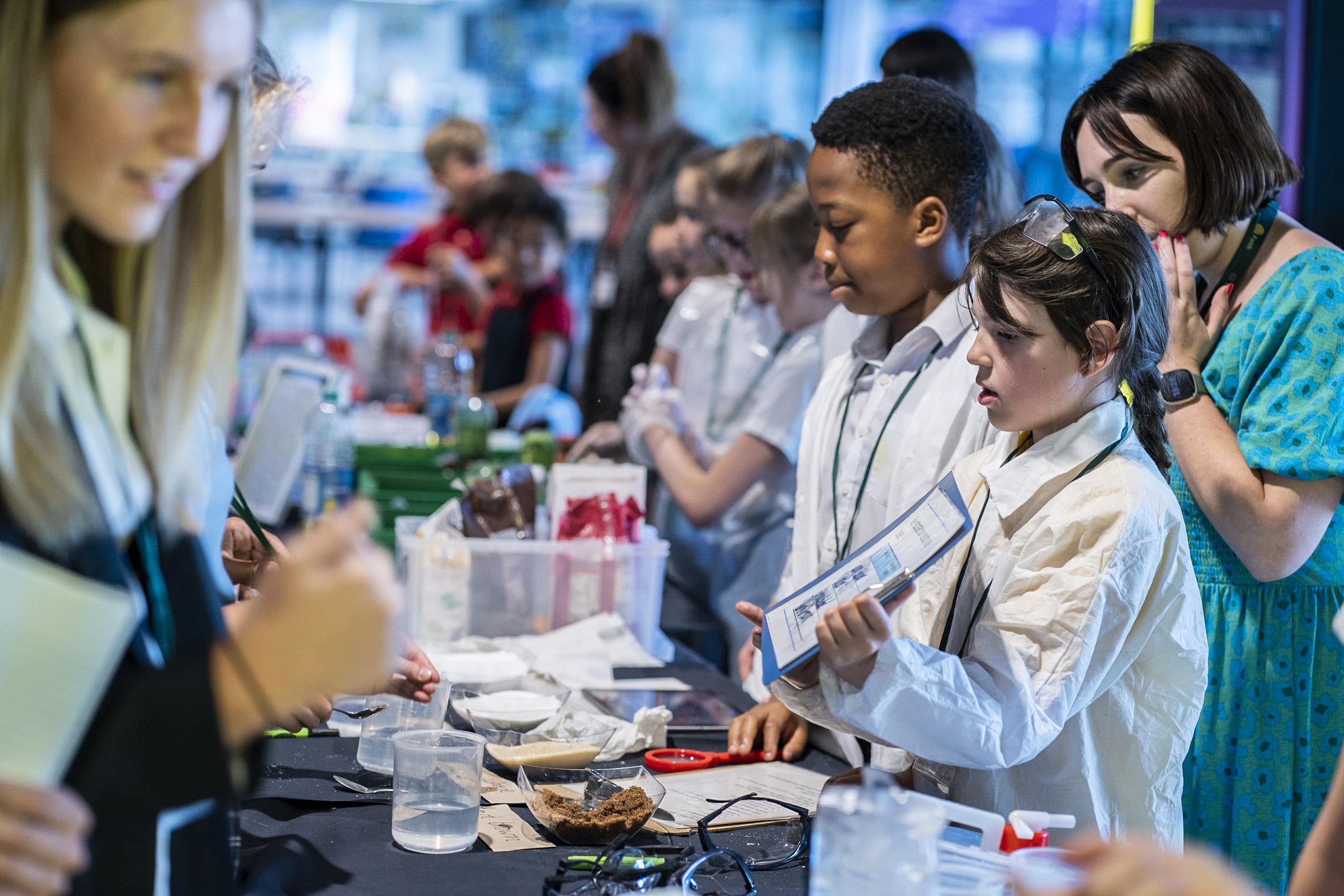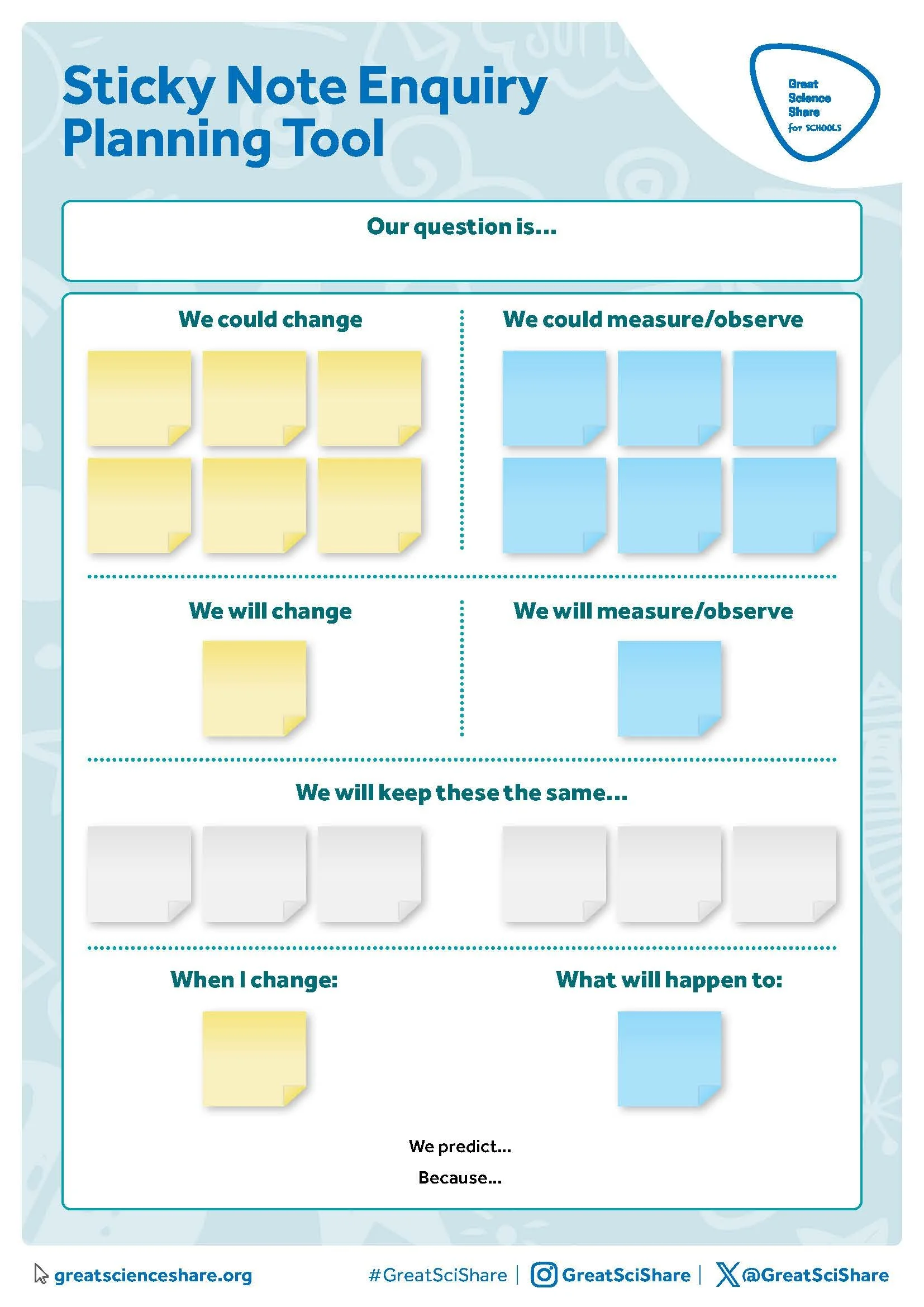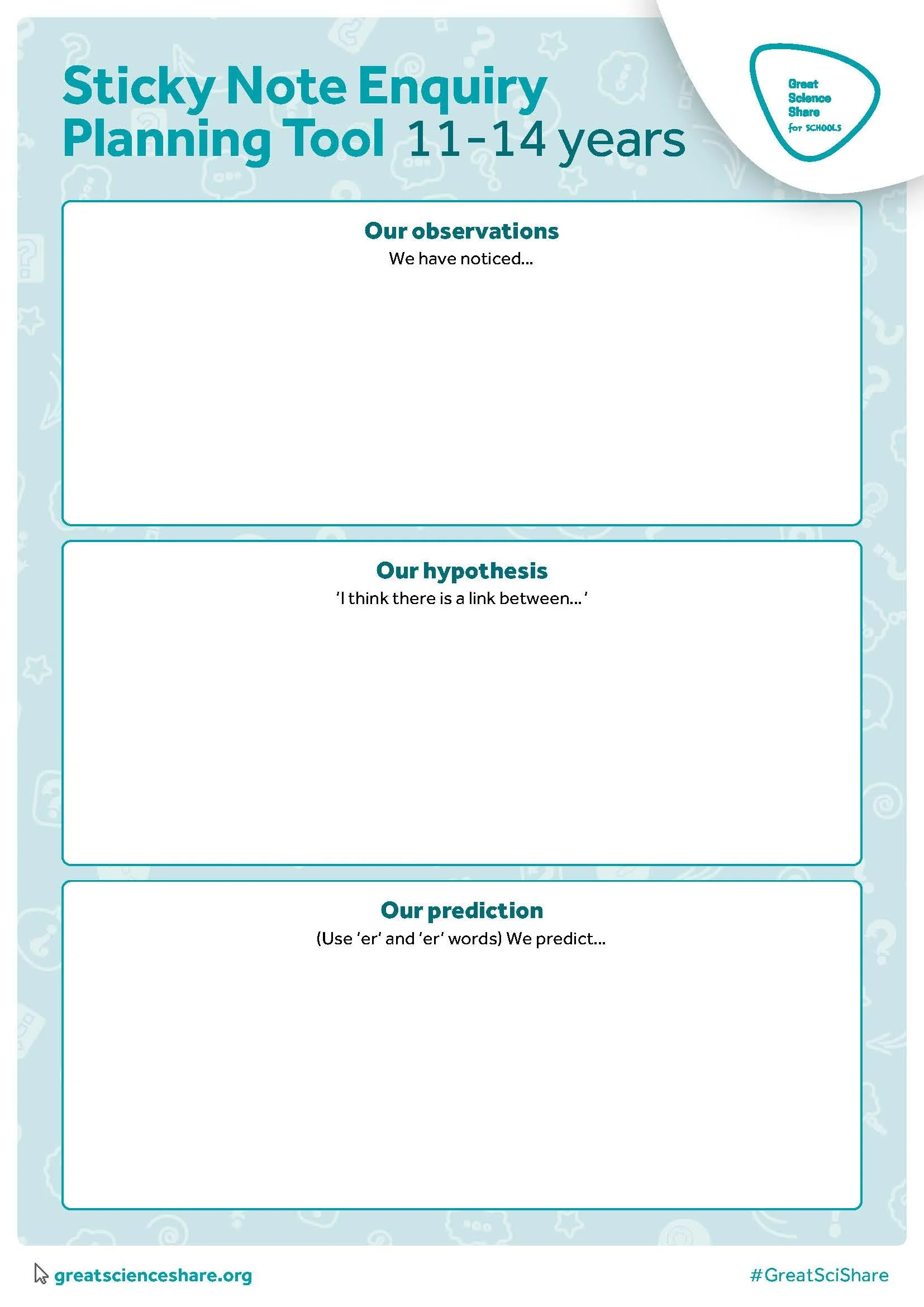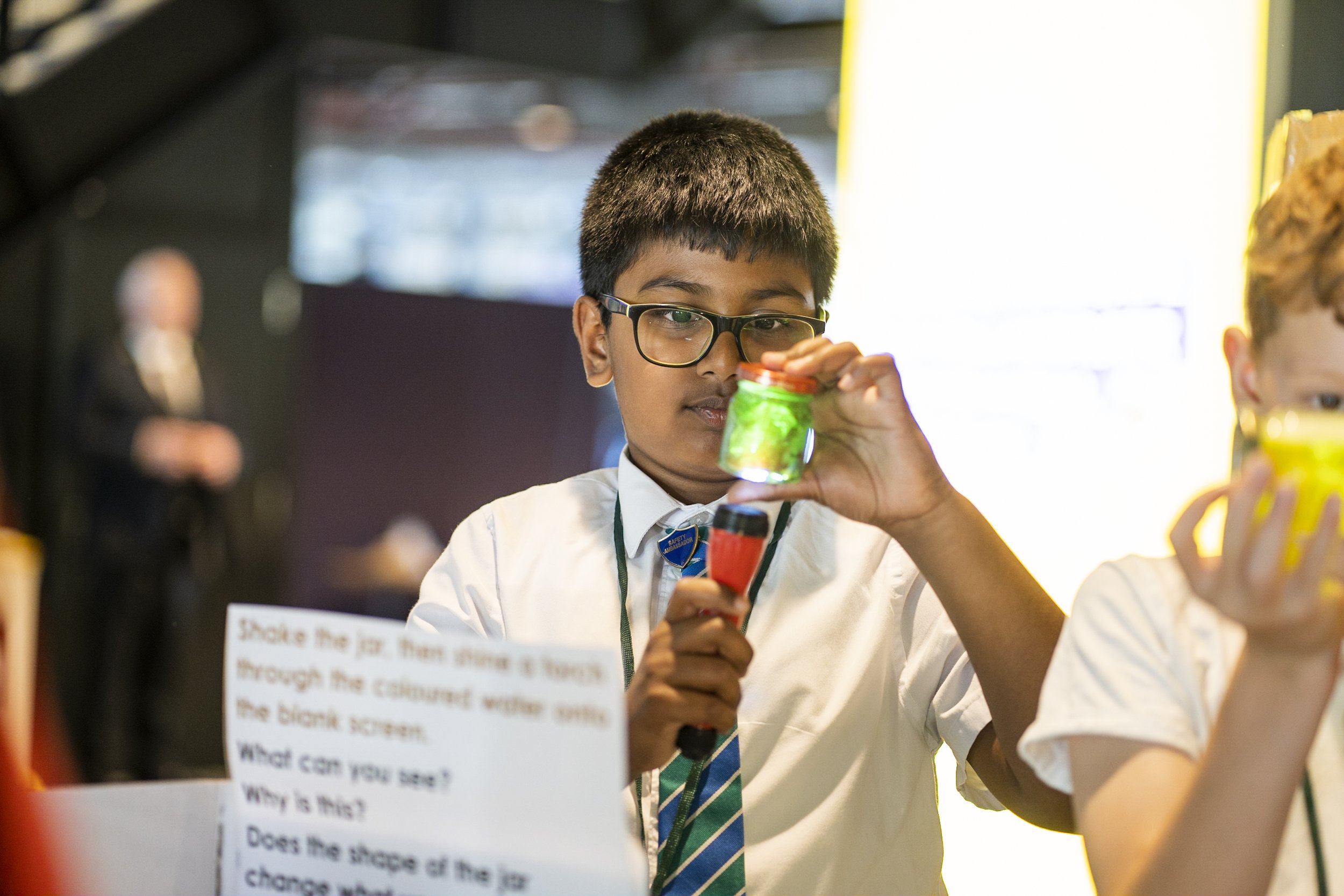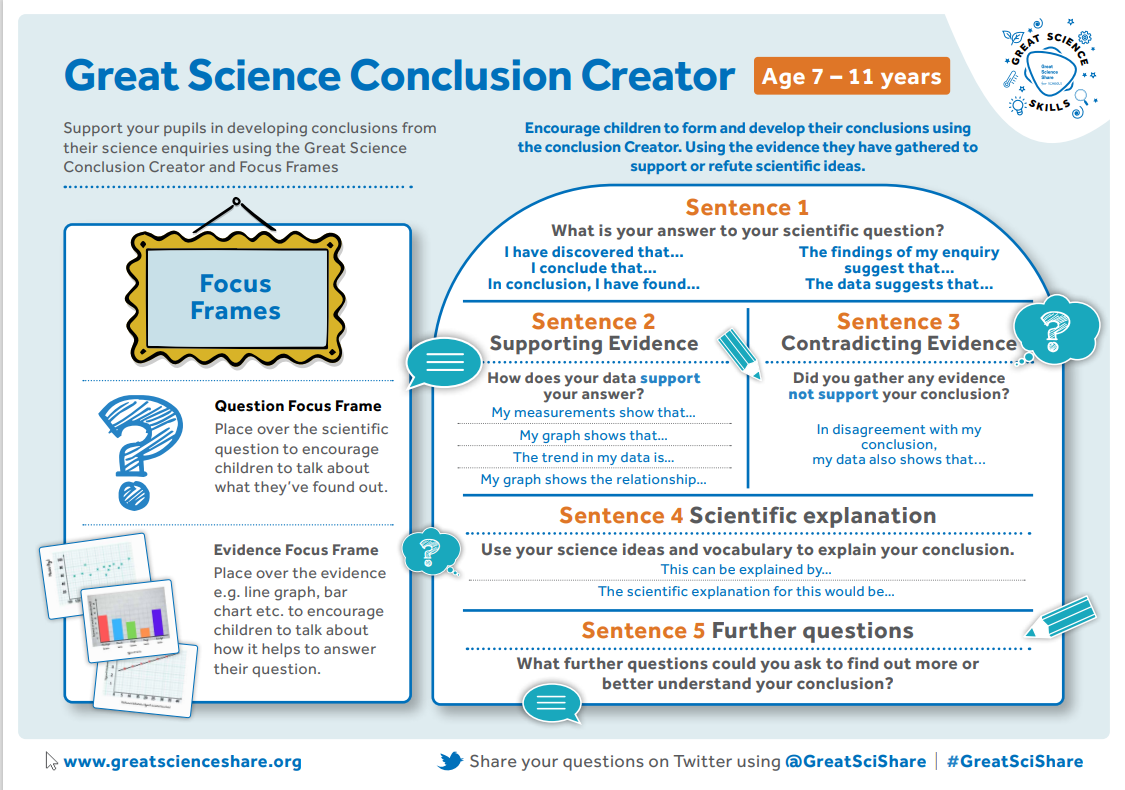










Toolkit Overview
Great Science Toolkit
Toolkit Overview
Great Science Toolkit
Giving direct support when pupils are working scientifically
How do we ask - investigate - share effectively?
This toolkit supports teachers with resources to engage pupils in working scientifically. GSSfS provides a great opportunity to build pupils’ confidence in asking questions, making predictions, analysing data, drawing conclusions and sharing outcomes.
The toolkit provides prompts and templates that can be displayed and used by pupils regularly when working scientifically independently or in groups.
All designed to enhance inclusion and quality in WOrking scientifically.
NEW FOR 2026
〰️
Group Roles
〰️
Sorting Selector
〰️
Model It Prompt
〰️
NEW FOR 2026 〰️ Group Roles 〰️ Sorting Selector 〰️ Model It Prompt 〰️
Do your pupils know and understand all the different ways to answer their scientific questions? Find more information and get support teaching the different enquiry types, with downloadable posters and logos below.

Question Makers
Question Makers
Question Makers
Question Makers
Develop the art of question-asking with the GSSfS Question Makers!
6 creative ways to inspire great scientific question-asking!
Asking questions is one of the most natural things to do. Asking great scientific questions is a bit of art and takes some practice.
Tips for question-asking:
Don’t hold back, all questions are good to listen to and think about
Ask questions together - talking with others can inspire questions
Play with your first ideas… what if you changed the question word? e.g. What are the planets? to What would happen if the planets were never discovered?
Which Great Science Share Question Maker will be your favourite?
Question Spinner
What you’ll need:
A pair of scissors, pencil and a paperclip
If you prefer - here’s a Welsh version of the Question Spinner resource!
Looking for a Spanish translation - Download here
Question Frame
What you’ll need:
A pair of scissors, pencil and sticky labels
If you prefer - here’s a Welsh version of the Question Frame resource!
Inspired by 100 ideas for Primary Teachers: Science
by Paul Tyler & Byrony Turford (2020)
Looking for a Spanish translation - Download here
Question Hand
What you’ll need:
A pair of scissors, pencil and paper
If you prefer - here’s a Welsh version of the Question Hand resource!
Looking for a Spanish translation - Download here
Question Wonder
What you’ll need:
A pair of scissors, pen
If you prefer - here’s a Welsh version of the Question Wonder resource!
Looking for a Spanish translation - Download here
Question Teller
What you’ll need:
A pair of scissors
If you prefer - here’s a Welsh version of the Question Teller resource!
Looking for a Spanish translation - Download here

Enquiry Planning Tool
Enquiry Planning Tool
Enquiry Planning Tool
Enquiry Planning Tool
Learn to plan your investigations and conclusions… with the Sticky Note Enquiry Planning Tool!
SUPPORTING GREAT SCIENTIFIC Enquiry
Planning is a skill that pupils need modelling. With the Planning Prompts, you can be sure that pupils are exposed to the method of planning their own investigations, from developing clear questions, deciding what to measure/observe and how they will set up their enquiries.
Use other tools from the Great Science Toolkit to help you with each stage.
TIPS FOR PLANNING:
Allow pupils time to verbalise the investigation they are going to tackle.
Ensure the enquiry question is clear and unambiguous so that pupils can then plan what they will be measuring/observing. This then helps them to make decisions on how they set up the enquiry and how they will record data.
Looking for a Spanish translation - Download here

Prediction Prompts
Prediction Prompts
Prediction Prompts
Prediction Prompts
Consider ‘what may happen if…?’ with the Great Science Prediction Prompts!
SUPPORTING GREAT SCIENTIFIC Enquiry
A prediction is when we think about what might happen in the future. Predictions are best written when linked to what the pupils know already, draw on their previous experiences, observations and learning.
TIPS FOR CREATING PREDICTIONs:
Encourage pupils to talk about the reasoning behind their predictions, using ‘because…’
Help pupils to understand that sometimes what happens in an enquiry doesn’t match what they predict. This doesn’t make their data wrong, or their prediction incorrect. This is part of the learning process.
If you forgot to consider a prediction at the start, encourage pupils to say whether what happened was what they expected to happen. It can be a useful reflective exercise anyway.
Download the prompt most suited to your pupils’ age or ability
Looking for a Spanish translation - Download here
Looking for a Spanish translation - Download here
Looking for a Spanish translation - Download here

Conclusion Creators
Conclusion Creators
Conclusion Creators
Conclusion Creators
Conclusions enable pupils to communicate the key learning from their investigations. Support them with the Great Science Conclusion Creators!
SUPPORTING GREAT SCIENTIFIC Enquiry
A conclusion is the summing-up of the evidence that’s been gathered and is communicated using a simple summary of findings. The Great Science Conclusion Creators encourage pupils to draw on evidence they have gathered to support or refute scientific ideas.
TIPS FOR Drawing a conclusion:
Review all the information and data gathered and analyse it to decide on the next logical step or assumption.
Look closely at the evidence to consider if there are any facts or details that are not stated, but could be extrapolated or inferred.
Explain your evidence using scientific explanations that link back to the question that was investigated and the predictions that were made.
Looking for a Spanish translation - Download here
Looking for a Spanish translation - Download here
Looking for a Spanish translation - Download here

Reliability Checker
Reliability Checker
Reliability Checker
Reliability Checker
Learn to judge if a scientific evidence is trustworthy… with the Great Science Reliability Checker!
SUPPORTING GREAT SCIENTIFIC Enquiry
Reliability relates to the whether a sources of information is trustworthy. By checking for reliability we limit the risk of using information that is false or biased. This improves the accuracy of our analysis and conclusion building. The Great Science Reliability Checker supports pupils to discuss the trustworthiness of information they gather.
TIPS FOR Checking reliability:
Explain to pupils that sometimes information can be presented in ways to try to persuade the reader of a certain viewpoint. This is often used in marketing products to improve sales or attention.
Giving a judgement of reliability should include i) A decision about whether the information is or isn’t reliable; ii) A 'linking' word to link the decision and the reasons (e.g. because, due to, since, etc.), and 3) A reason for the decision.
E.g. This source is very reliable because it was published in a peer-reviewed journal.
Looking for a Spanish translation - Download here

Observe and Draw Prompt
Observe and Draw Prompt
Observe and Draw Prompt
Observe and Draw Prompt
Learn to make scientific drawings… with the Great Science Observe and Draw Prompt!
SUPPORTING GREAT SCIENTIFIC Enquiry
Step-by-step skills building focussing on the scientific enquiry skills pupils need to develop.
TIPS FOR Scientific DrawinG:
Pupils get the opportunity to draw in subjects across the curriculum. However, the skills of producing a scientific drawing is very different to an artistic drawing. Pupils will need explicit instruction and will then need the opportunity to practise this skill again and again in different contexts throughout their science learning.
Explain to pupils that the skill of producing a scientific drawing is a skill that is used by many scientists, including botanists and entomologists as seen in the Great Observation Share enquiry.
The ‘Top Tips’ can be found on the Great Observe and Draw Prompts below, and are differentiated by age (5-7 year olds, 7-14 year olds).
Looking for a Spanish translation - Download here
Looking for a Spanish translation - Download here

Share Prompts
Share Prompts
Share Prompts
Share Prompts
Share science creatively with the Great Science Sharing Prompts!
SUPPORTING GREAT SCIENTIFIC Enquiry
Sharing inspires us to communicate the questions and conclusions from our investigations with new audiences. Encourage your pupils to share in a way that they may not have considered before by using the Great Science Sharing Prompts for ideas.
TIPS FOR Sharing scIENCE:
Explain the question that was investigated and why this was important to spend time on. What was the gap in knowledge or understanding the question sought to address?
Describe the type of enquiry used to investigate the question: observation over time; comparative/fair testing; pattern seeking; research by secondary sources, and identifying, grouping and classifying etc.
Communicate how the evidence gathered makes a difference to other people - in their lives, home, school or across the world.
TIPS FOR CREATING A SHARe:
Looking for a Spanish translation - Download here
Looking for a Spanish translation - Download here
If you prefer - here’s a Welsh version of the Question Share resource!
Looking for a Spanish translation - Download here

Talk Prompts
Talk Prompts
Talk Prompts
Talk Prompts
Great Talk Prompts
SUPPORTING GREAT SCIENTIFIC Enquiry
Often we can assume that effective talk comes easily. Talking is a skill that we need to hone just like any other. Science is a collaborative subject, with people across the globe sharing fields of research, business and endeavour. Use the Great Science Talking Prompts to support your pupils in talking effectively in groups by thinking about the verbal behaviours they use when they react to what other people say and seek to clarify understanding in discussions.
TIPS FOR TALK:
Explain that there are no right or wrong verbal behaviours - each are helpful when used at the right time for the right purpose.
Model how different kinds of talking behaviours can impact on group discussions. Being right isn’t always persuasive, so showing how we use talk to bring influence other people is something to master.
Encourage pupils to have confidence to share opinions even if they are different to what others are saying. Setting the culture to listen to different viewpoints is necessary in science and life.

Progression Tool
Progression Tool
Progression Tool
Progression Tool
Get tips for assessing progression… with the Great Science Progression Tool!
SUPPORTING GREAT SCIENTIFIC Enquiry
Across each age range pupils work scientifically in different ways, from forming enquiry questions, recording data, predicting and concluding to name a few. Assessment of these disciplinary skills is required to support pupils to develop.
TIPS FOR ASSESSMENT OF ENQUIRY SKILLS:
Use the Great Science Progression Tool to understand the level of prior learning/attainment the pupils have encountered. The tool maps out the core skills pupils need at each stage and breaks them down into manageable steps to work from.
Assessment should always have a positive impact on pupils and their learning. Consider if your assessment methods are reliable and valid. Most importantly, is learning being enhanced and deepened as a result of the assessment data you collect.
For more resources on primary science assessment, refer to the TAPS (Teacher Assessment in Primary Science) resources here.
Looking for a Spanish translation - Download here
















